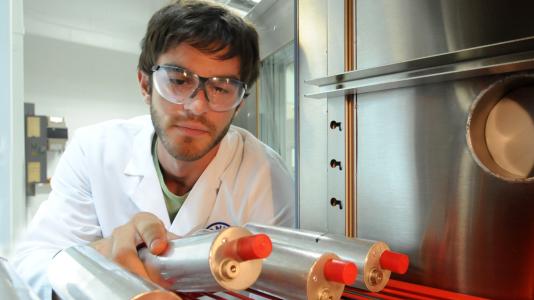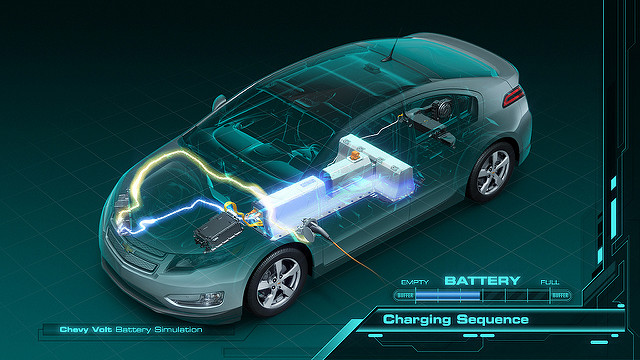
General Motors Co., LG Chem, Ltd. and the U.S. Department of Energy’s Argonne National Laboratory announced today they have reached a licensing agreement to use Argonne’s patented composite cathode material to make advanced lithium-ion batteries that last longer between charges and can charge at higher voltages.
The technology is in the battery cell that is powering General Motors Company’s Chevrolet Volt, the first mass-produced plug-in hybrid electric vehicle. The Volt has an EPA estimated range of 35 miles on a full charge. Read the story »
Official News Releases
LG Chem, Argonne sign licensing deal to make, commercialize advanced battery material »
GM, Argonne sign licensing deal for advanced battery chemistry »
Argonne’s Battery Research
Argonne National Laboratory has engaged in battery research and development for more than 40 years.
More than a decade ago the laboratory made a strategic decision to expand its research of Lithium-ion batteries, with a particular focus on developing applications for electric cars. That decision and subsequent investments for research by the U.S. Department of Energy have yielded numerous technology transfer agreements, 149 inventions, more than 40 patents and four R&D 100 Awards.
A major reason for Argonne’s success in developing lithium-battery solutions is that its program goes from basic to applied research and extends to collaborations with battery makers and materials suppliers to develop safe and energy dense batteries.
Ever evolving, Argonne’s energy storage program now include overcoming the scientific challenges that hinder Li-air batteries, which hold the promise of increasing the increasing the energy density to as much as five to 10 times that of Li-ion batteries.
Beyond applications for vehicles, Argonne is exploring energy storage technologies for large-scale use by electric utilities as they bring online renewable energy sources like wind and solar. Because of their intermittent nature, energy generated from these sources can be stored in massively large batteries for use at a later time when they can be seamlessly moved onto the electricity grid without hampering the steady flow of electricity across the grid.
Recent Technology Transfer Agreements
- Argonne’s lithium-ion battery technology to be commercialized by BASF
- Argonne Transfers High Power Battery System to EnerDel, Inc.
- Argonne’s lithium-ion battery technology to be commercialized by Japan’s Toda Kogyo
Argonne Energy Storage Experts in the News
- The Great Battery Race, Foreign Policy magazine
- Building a Better Battery, Newsweek
- Will Lithium-Air Battery Rescue Electric Car Drivers From ‘Range Anxiety’?, The New York Times
- Mobile Power Sources Impact Military Operations, Power Electronic Technology
- Licensing Executives Society Announces 2010 Deals of DistinctionTM Awards, IPWatchdog
